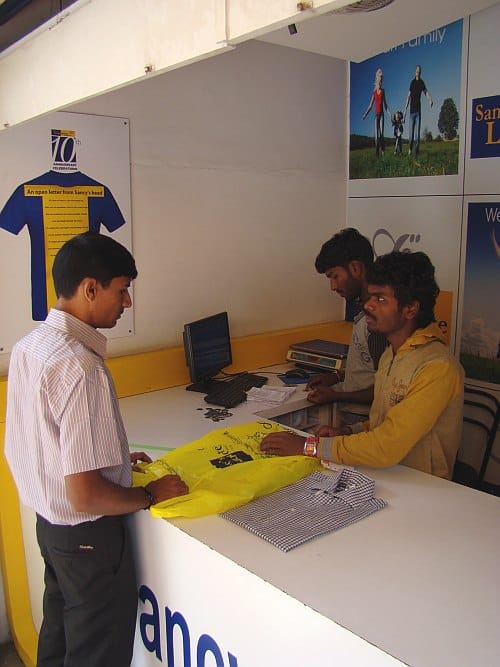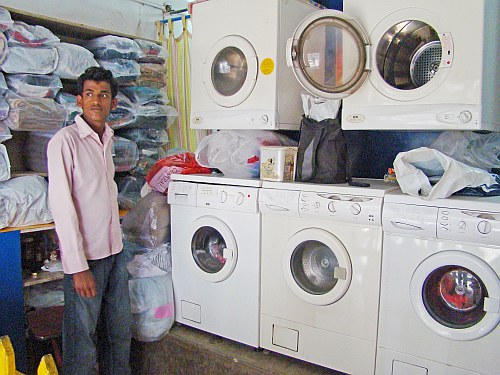For Samaksh Kapoor, 22, a M.Sc. student, a laundry service is the only way he can get his clothes washed and ironed. He gives 4-5 kilos of clothes every week to Sancy’s Launderette in 3rd Phase JP Nagar. “My family does not live in Bangalore. As I am busy with studies, I don’t find time to wash my clothes.” He says that the service at the launderette is quicker than a traditional dhobi. “So, this is my only option,” he says.

Village Laundry Service Kiosk. Pic: Yogaraj Mudalgi
Bangalore has had a steady influx of students and professionals from outside the city, many do not find time or do not have space in their homes to wash clothes. They rely on laundry service for getting clothes washed. Ravikant Upadrasta, 29, software professional says, “I am concerned about the kind of water traditional dhobis use. I prefer launderettes as they seem to be more hygienic,” he says.
While it is the only option for some, some people prefer launderettes for convenience. Shama, 43, a home maker living in JP Nagar, gives mostly her husband’s formal clothes for laundry as she feels a machine wash will result in less wear and tear. “A domestic worker washes our daily clothes. We give formal clothes and occasionally a rug or blanket since it is not comfortable to wash them at home.”

Sunbright Drycleaners. Pic: Yogaraj Mudalgi
Several launderettes, particularly multi-outlet chains have opened up in Bangalore. Some of them are Sancy’s Launderette, Village Laundry Service (VLS), IFB launderettes and Fabric Spa.
Premium launderettes
Premium laundry service like Fabric Spa, a venture of Jyothi Laboratories, has five outlets across the city and handles all kinds of fabrics. It also has door-to-door pickup and delivery service. However, they don’t charge by the kilo. They charge for each article of clothing. Laundering a handkerchief costs Rs 25, shirt costs Rs 105, sarees are charged between Rs 200 and Rs 345 (depending on the material), suits are charged between Rs 380 and Rs 495. Apart from basic laundering, they also dry clean, specialise in stain removal, super creasing (infusing creases on trousers), simple darning and many other services.

Sancy’s Launderette. Pic: Yogaraj Mudalgi
IFB and VLS outlets, which operate on franchisee basis, are equipped with washing and drying machines and all the processing is done in-house, Sancy’s has a factory in Koramangala and Fabric Spa, a unit in Doddaballapur where the clothes are shipped for laundering.
Laundry happy customers are not easy
Laxmikant Sansuddi, who owns Sancy’s launderette chain, says that customer dissatisfaction can prove costly for business and keeping them happy with the service is an arduous task. He says on-time delivery is the most important factor that keeps a customer satisfied.
K Ramchandran, 60, a regular customer of Sancy’s says that he almost stopped using the service because of delay in service. “They had some labour issues and deliveries were getting delayed but we cannot wait till their issues are resolved. I started using the service again only after assurances from the management. I have had no problem since then.”

The IFB Launderette in Jayanagar. Pic: Yogaraj Mudalgi
There are other issues which affect customer satisfaction. Says Sansuddi, “Customers expect us to give individual attention to each of their clothes. Even if a small stain remains, we get complaints. Although we try to do our best, we cannot be spot on every time.”
Shashidhar, who runs the IFB Launderette franchise in JP Nagar, agrees that keeping a customer happy can be difficult. “Some people wear jeans trousers for weeks. They get really dirty and an ordinary wash cannot get rid of all the dirt. There is only so much we can do. We have to be forthright with the customers in such cases” he says.
So are the traditional dhobis in trouble?
Eshwar, 42, who runs Sunbright dry cleaners in Jayanagar, says that laundries don’t affect their business. He says, “Many people still prefer traditional dhobis as they are cheaper and deliver clothes at home. Also, dry cleaning is a different segment altogether.”
Anjaneya, who irons clothes in BTM Layout, says that laundry services have indeed hurt business but the damage is not severe. He irons up to 200 clothes in a day, charging Rs 4 for a shirt and Rs 5 for trousers. He says that there are many people who wash clothes by themselves and give it us for ironing. “They are our main customers. I don’t perceive an imminent threat from laundry services as of now.”
Location of different laundry outlets
- Fabric Spa: Indira Nagar, Sadashiv Nagar, Koramangla, Mantri Square and Whitefield Sancy’s: Three in Koramangla, JP Nagar, Bellandur-Sarjapur Road, Indiranagar and BTM Layout
- Village Laundry Service: Anand Nagar, Magadi Road, Rajarajeshwari Nagar, Sahakar Nagar, Uttarahalli, Banaswadi, Rajaji Nagar, White Field, Yelahanka, Banashankari, Bannerghatta Road, Sanjay Nagar, Sultanpalya and Mahalakshmi layout
- IFB Launderettes: Byatarayanapura, JP Nagar, New Thippasandra